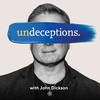

Undeceptions with John Dickson
Undeceptions Ltd
Every week on Undeceptions we’ll explore some aspect of life, faith, history, culture, or ethics that is either much misunderstood or mostly forgotten. With the help of people who know what they’re talking about, we’ll be trying to ‘undeceive ourselves’ and let the truth ‘out’.
Episodes
Mentioned books
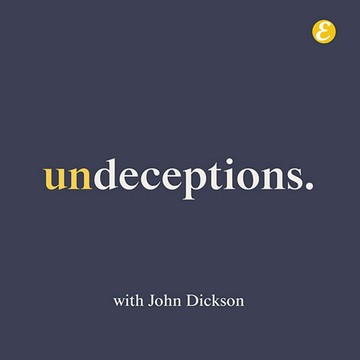
Apr 11, 2021 • 15min
Western Fundamentalism Single
Gordon Menzies advised the federal government on the deregulation of the Australian dollar, underlining his credentials when it came to liberalism.However, his new book titled 'Western Fundamentalism' suggests a more conservative way of seeing the world.He tells John Dickson, though, that a Christian is capable of rejecting definitions of both left and right to forge a distinctly different path.
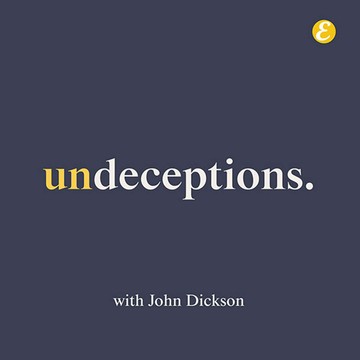
Apr 4, 2021 • 10min
American Soul Single
Dr. Laurel Moffatt rejoins the Undeceptions team to consider the state of the American soul.Researchers have revealed that this nation of the bold and the free is now united more by the things that its citizens hate than those they love.Is there any way out of this emotional and moral quagmire? Dr. Moffatt thinks so.
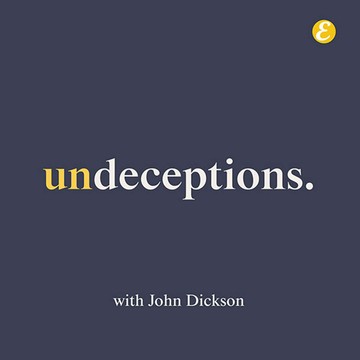
Mar 28, 2021 • 19min
Still Cancer Single
How do you face the rapidly approaching end of a battle with cancer?In Series 2, Episode 13 of Undeceptions, John Dickson met up with his friend Ben Shaw to discuss his recent diagnosis of that dreaded disease.The It's Cancer episode raised serious questions about what place pain has in a world created by a good God.Now, in the run-up to Easter, John returns to ask Ben if the call to face cancer has brought on new spiritual insights.
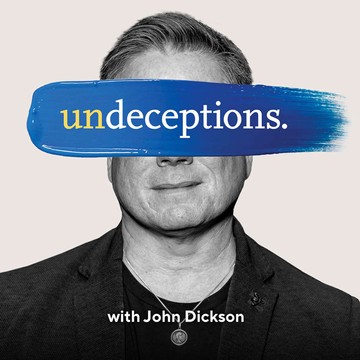
Jan 10, 2021 • 59min
37. Racist Church
Some would argue that Christianity itself is racist. Given the sweep of history, this is a charge that has to be confronted. So we’re going to speak to a couple of people who, despite all the things the church has done wrong -- and continues to do wrong -- and despite all the things the church should be doing but just isn’t - still see Christ as Lord. They are still part of the church. They still think Christianity is beautiful, even if parts of the church are not. You as listeners - whether you believe or not - are going to have to be the judges here. This is not an episode in which I feel competent to lecture anyone. I don’t know what it’s like to be a minority. That’s why we’re speaking to people today who do know. LINKSMeet our guest, Jemar Tisby Read his latest book, How to fight racismRead Jemar’s other book The Colour of Compromise: the truth about the American Church’s complicity in racism Check out The Witness Get to know Brooke Prentis Find out more about Common GraceWatch Brenda Salter McNeil’s full talk on her ‘response to racism’ This episode is supported by Zondervan Academic’s book Evangelical Theology by Michael Bird Full CNN report on the global protests sparked by the death of George FloydRead more about the Black Lives Matter movement in this series from The New YorkerDivided by Faith: Evangelical religion and the problem of race in America, Michael Emerson and Christian SmithListen to Tim Keller’s full speech on Racism and Corporate Evil Also read Tim Keller’s series on justice and race in the Gospel In Life MagazineThe Bible and Race The Sin of Racism A Biblical Critique of Secular Justice and Critical Theory Justice in the BibleRead more about the Southern Baptists and Critical Race TheoryAnd a little more about Critical Race Theory more generally: Are all white people racist? Why Critical Race Theory has us rattled, Sydney Morning HeraldMore on Australia’s Aboriginal historyMapping the massacres of Australia’s colonial frontier, The University of Newcastle More on the Aboriginal reserves and stations Close the Gap 2020: The annual report of Parliament on progress in Closing the Gap and achieving equality for Aboriginal and Torres Strait Islander people in health and life expectancy Bringing Them Home Report 1997 - A Report of the National Inquiry into the Separation of Aboriginal and Torres Strait Islander Children From Their Families.Prime Minister Kevin Rudd says “Sorry” on behalf of the Australian Government in 2008 Watch Australia’s National Aboriginal Bishop in the Anglican Church, Chris McLeod’s full interview on Black Lives Matter and the Church Brooke Prentis gave us three pieces of content she believes all Australians should consume to learn more about the true history of Aboriginal and Torres Strait Islander peoples in Australia:Dark Emu, by Bruce PascoeTalking to My Country, by Stan GrantFirst Australians documentary, SBSHere's the alternate view on racism in AmericaCandace Owens is a conservative US commentator who has a very different take on the Black Lives Matter movement and how she thinks her country should be dealing with racism. On what she believes is the real goal of the Black Lives Matter movementOn White GuiltBen Shapiro is one of the most popular conservative commentators in the US. He disagrees with the idea of systemic racism. More here.Undeceptions T-Shirts are here! Click here to get yours now.

Jan 3, 2021 • 1h 5min
36. 100 Pages
Perhaps you’re sceptical, perhaps you’re just undecided - our challenge for you for 2021 is: read at least 100 pages of the Bible. This book has shaped much of our world. It would be great to think that you’ve got your head around at least 100 pages, as an adult, with all your grownup questions activated. Yes, the Bible is weird. It’s got wars, bizarre laws, talking snakes, perhaps even a unicorn or two, slavery, misogyny, and much more. But there is way to read this stuff, and there’s a way not to.And we reckon today’s guest can help us with both, and make 2021 TO ETOS TES BIBLOU, the year of the Bible.This episode is brought to you by Zondervan Academic’s new book How to Fight Racism by Jemar Tisby.LINKSMeet our guest Dan KimballAnd get his new book How NOT to read the Bible: Making Sense of the Anti-Women, Anti-Science, Pro-Violence, Pro-Slavery and Other Crazy Sounding Parts of ScriptureRead more of the Finder survey that explored how many Americans make NY resolutions.And that Forbes Magazine article about how many will actually accomplish those resolutions.Here’s the full list of the most common NY resolutions according to “Polly” the artificial intelligence operated by the market research firm Advanced Symbolics Inc.Read the study that found that for around a half of adults today and two-thirds of under-25s, the Bible has absolutely no significance in their personal lives.Here's why might you want to read the Bible, even if you’re not a Christian. Dr Meredith Lake from the ABC wrote this piece for The Conversation in 2017 about why our decline in biblical literacy matters:"Among Australian creatives, too, literary lights such as Patrick White, Elizabeth Jolley, Tim Winton, Helen Garner and Christos Tsiolkas all make powerful use of biblical narratives and imagery. Songwriters from Nick Cave to the late Yolngu star Gurrumul have drawn on the scriptures in their lyrics."Biblical stories and symbols have also inspired visual artists such as Grace Cossington Smith, Arthur Boyd and Margaret Preston. Reg Mombassa’s popular creation, “Australian Jesus”, offers a subversive take on the gospels."Each of these Australians has found the Bible an enlarging influence on the imagination. Audiences can easily miss key elements of their work without a degree of biblical literacy."Or check out this book by John Dickson’s friend, and co-founder of The Centre for Public Christianity Dr Greg Clarke, The Great Bible Swindle, written especially for those who feel that they should know something about the world's most influential text, but may have been afraid to ask.Watch The West Wing scene about the Old Testament in modern times.Were footballs ever made of pigskins?Meet our 5 Minute Jesus author this episode, Laurel Moffatt.Christopher Hitchens speaking to Vanity Fair on the Ten CommandmentsUndeceptions Single series on slavery:Swing low: The campaign against slavery was a shining jewel in the collection of social changes that swept the 19th century. However history shows us it was clearly not a secular viewpoint that set people free.First Abolitionist: Gregory of Nyssa could have been the man who changed history, if history had listened to his theory on slavery.Freeing Slaves: The early church adopted many approaches to rescuing people from the scourge of slavery and, when legal means failed, its members were ready to risk themselves on slave raids.Medieval Manumission:What would you be prepared to give in order to set a slave free? How much would it be worth to you? One medieval man gave everything he had, right down to the shirt off his back. Indigenous slaves: Was Australia built on slavery, or wasn't it? It depends very much on who you ask.Make 2021 TO ETOS TES BIBLOU, ‘The Year of the Bible’Take up John Dickson’s challenge of reading at least 100 pages of the Bible this year. Here’s his Top Ten Old and New Testament Bible passages to get you started. Here’s some links to translations John Dickson recommends: New International Version (NIV)New Revised Standard Version (NRSV)English Standard Version (ESV)Learn more about Greg Koukl’s Never Read a Bible Verse which he says is his attempt to His “rescue believers from a superstitious way of reading their Bibles that causes silliness, confusion, and sometimes even disaster.”Here’s an overview of the storyline of the Bible.The visual was created by a church here in Sydney, based on a book by friend of the podcast, Vaughan Roberts, titled God’s Big Picture.Undeceptions T-Shirts are coming really soon! We've got top quality Ts in medium, large and x-large that will help you promote the show and do your own bit of undeceiving. Head to undeceptions.com later this week - they'll be ready for purchase soon.

Dec 27, 2020 • 59min
35. Ask Anything III
You may not feel ready to experience heaven or hell quite yet but Undeceptions listeners certainly had a lot of questions about it! In this season’s Q&A episode, John Dickson attempts to answer at least some of the questions you’ve thrown at us this year. This episode is brought to you by Zondervan Academic’s How NOT to read the Bible by Dan Kimball LINKSWhat Dreams May Come trailerThe Good Place, TV show: how points are scored in lifeThe Rebel, by Albert CamusQUESTIONS Is the punishment of Hell proportional to our acts on Earth? Are there levels of Heaven? Why do we know so little about Heaven? What are we to think of God who is always present, even in the face of evil and abuse? Why is it considered Good News, if so many who don’t believe will end up in Hell? Do we lose our free will in heaven? Are demons real? Should Christians eat meat? Is there any benefit in reading the Apocrypha?Even if I believed in God, why would I believe in the Christian God? What makes Jesus so special as opposed to, say, Islam?Has the modern church tried to white-wash Jesus?Is the church trying too hard in its attempts to persuade same-sex attracted church people to live holy lives rather than relying on God and the power of the gospel?What should we do about the health, wealth and prosperity gospel? Extra questions John answered this seasonDrew asks,The highly regarded scholar David Bentley Hart’s somewhat recent translation of the New Testament translates the Greek work ‘aion’ [i-on] or ‘aionios’ [i-on-ios] to be the more temporal description of ‘of the Age’ rather than the traditional ‘eternal’.This seemingly impacts the well-established Christian doctrines of heaven and hell. Is the claim of life eternal through Jesus now seriously up for debate?Listen to John’s answer at undeceptions.com Follow up this question with some extra reading: David Bentley Hart’s translation of the New Testament A review of Bentley Hart’s translation in The Atlantic.More about Universalism.How Universalism, ‘the Opiate of the Theologians,’ Went Mainstream, Christianity Today.Steve asks, I just listened to the first podcast - Old Papers. I had always thought Paul wrote Hebrews, lately my various pastors have suggested that, no, Paul did not write Hebrews. Hearing that Hebrews was in these old papers of Paul’s writings made me think, I wonder what the answer is?Listen to John’s answer at undeceptions.com

26 snips
Dec 20, 2020 • 1h 6min
34. World's End
Christianity has plenty to say about the future and what the end of the world might look like -- though some think it says a lot more than others.Christians have, in fact, been accused of being obsessed with end times, so much so that they stop caring about the world they’re in right now. And sometimes that’s true. But apocalyptic Christians aren’t the only ones dwelling on all this. Plenty of us are more interested than ever - especially this year! - in how the world will end. The stories we tell ourselves in culture are becoming increasingly apocalyptic. Why is that? This episode is brought to you by our season sponsor Zondervan Academic, publishers of the Collected Essays of N.T. Wright.LINKSHave a read through The Book of Revelation.Watch Australia’s Secretary for Home Affairs, Michael Pezzullo’s, full speech on ‘Securing Australia’ here. Get to know our guest, Alissa Wilkinson from VoxAnd read Alissa’s book How to Survive the Apocalypse: Zombies, Cylons, Faith, Politics and the End of the WorldPssst… here’s an except of the book, a chapter on ‘The Myth of the Secular ApocalypseGet to know our guest, Professor Richard Bauckham, one of greatest living theologians.Professor Bauckham has written many, many books. But since our discussion revolved around the Book of Revelation, you should check out his book on that subject, The Theology of the Book of Revelation Here’s the 2010 New York Times article Alissa mentions by Chuck Klosterman, My Zombie, Myself: Why modern life feels rather undead.For a more in-your-face example of how pop culture continues to use biblical imagery from The Book of Revelation, just watch the trailer for the 2016 blockbuster, X-Men.The film’s director Bryan Singer told the LA Times that Apocalypse - an immensely powerful and ancient mutant - views himself not as a mutant but as a god. Singer says, quote “For all intents and purposes, he is potentially the God of the Old Testament. After being buried for 4,000 years, he awakens to a society that has become interconnected and developed hubris. Humans have created nuclear weapons and assumed godlike proportions in the buildings they build and the things they create. So he sets about to eradicate those things and build what he considers a cleaner, purer world.”Check out Alissa’s Syllabus for the End of the World - her list of stories that tell us how to live during -and after - a pandemic.Here’s the Al Jazeera tape of Harold Camping’s apocalypse prediction in 2011Here’s the Left Behind book series… but John reckons you should skip it. Read C.S. Lewis’ Narnia Series instead.More on the US National Evangelical Leaders survey of 2011, which found that 65 per cent of evangelical church leaders in the US identify with premillennial theology, which grounds this rapture idea.Watch REM’s Michael Stipe’s full Coronavirus message.More on the Macquarie Dictionary’s Word of 2020, “Doomscrolling”John quotes from the pseudepigraphal work (not in any biblical canon) Psalms of Solomon in this episode’s 5 Minute Jesus. Read more about them here.Movies and TV referenced in this episodeGame of ThronesThe Walking DeadCormac McCarthy’s novel, The Road, and the “very fine” movie.Wagner’s Ring CycleThe Hunger Games EXTRASHere’s John Dickson and Professor Bauckham’s discussion on ‘the Millennium’ in the Book of Revelation. Listen here. WIN! We’re giving away 20 copies of John's book, 666 And All That: The Truth about the End Times, which he co-wrote with Dr Greg Clarke. If you’d like to win a copy, you just need to be one of the first 20 new subscribers to the Undeceptions e-newsletter. So quick! Head to undeceptions.com, scroll down to the bottom of the homepage and subscribe now. We'll be in touch with the winners in the first week of January.

Dec 13, 2020 • 59min
33. Danger: Proselytising
Proselytise: to convert or attempt to convert (someone) from one religion, belief, or opinion to another.Why are Christians such god-botherers? Is it possible to share your belief system with someone who doesn’t accept without being a jerk?Many people today would have you believe that there is no context in which proselytising could be considered a good thing. This episode is supported by Zondervan's MasterLecture Series. LINKSFind out more about our guest, Dr Sam Chan And check out his latest book, How to talk about Jesus (without being THAT guy) And here's a rather extensive review of Sam’s book here.Sam's book Evangelism in a Skeptical World: How to Make the Unbelievable News About Jesus More Believable won Christianity Today's Book of the Year in evangelism and apologetics. PS -- How to Talk about Jesus (without being THAT guy) is the popular-level version of the more textbook-style Evangelism in a Skeptical World.Sam quoted Mark Sayers, co-host of the podcast This Cultural Moment.Want to send John Dickson a question? He loves them. Just click here to provide a query for our next Q and A show!Undeceptions is part of the Eternity Podcast Network, an audio collection showcasing the seriously good news of faith today.

Dec 6, 2020 • 44min
32. Homo Deus
Transhumanism is the transformation of the human condition through sophisticated technologies that modify our physiology and intellect. This episode, we continue our conversation about Artificial Intelligence with Professor John Lennox, and Dr.s Vicky Lorrimar and Grenville Kent.This episode is brought to you by series sponsor Zondervan Academic, publishers of How to talk about Jesus without being THAT guy by Sam Chan.LINKS Meet Professor John LennoxGet Professor Lennox’s book 2084: Artificial intelligence and the future of humanitySay hi to episode guests Dr Grenville Kent and Dr Vicky LorrimarWatch this primer on ‘Transhumanism’ from BBC Ideas.Read The Age of Spiritual Machines by Ray Kurzweil (Lennox called him one of the most insightful people on this topic last episode)Watch this Ted Talk on how close we are to be able to ‘upload our minds’This is the article on The Washington Post in which Elon Musk talks about AI as summoning the demon (as mentioned by Lennox)Here’s a useful explainer on Utilitarianism from University of TexasRead this profile on Peter Singer from 1999 in The Guardian: The most dangerous man in the worldDig deeper into Peter Singer’s utilitarianism views, critiqued by John Lennox here.More on Naturalism.Read CS Lewis’ essay ‘On living in an atomic age’ in his book of essays ‘Present Concerns’Learn more about quantum mechanics in 60 seconds on BBC with Brian CoxRead 'The strange link between the human mind and quantum physics', BBCMovie and Television referenced in this episode: The Bourne IdentityAltered CarbonGattacaWestworldWant to send John Dickson a question? He loves them. Just click here to provide a query for our next Q and A show!Undeceptions is part of the Eternity Podcast Network, an audio collection showcasing the seriously good news of faith today

Nov 29, 2020 • 42min
31. Artificial Intelligence
"I'm all for technology being used in a good sense. I often say to people, AI is like a knife, a very sharp knife. You can use it to operate with, or you can use it to kill people." -- Professor John Lennox Artificial Intelligence is the buzz phrase of the 21st century. For some, it’s a welcome step into a future that promises all manner of good. For others, AI is damaging at best and, at worst, a step towards our own destruction.This episode, with the help of the great John Lennox, we ask the question: is Artificial Intelligence an under-estimated threat… or the saviour we’ve been waiting for?This episode is brought to you by series sponsor Zondervan Academic, publishers of Telling a better story: how to talk about God in a skeptical age by Josh Chatraw.LINKS Meet Professor John LennoxGet Professor Lennox’s book 2084: Artificial intelligence and the future of humanityRead more about how China is using surveillance technology to keep tabs on its citizens in this article from The Atlantic: 'The Panopticon Is Already Here'Check out George Orwell’s masterpiece 1984 Learn more about the Singularity with this article from Futurism: 'Singularity: Explain it to me like I’m 5 years old' Why Elon Musk fears artificial intelligence, Vox Lennox called Google’s Chief Futurist, Ray Kurzweil, “one of the great gurus in this field”. Read more about him here.Find out more about Yuval Noah Harari, author of Sapiens and Homo Deus Watch the Astronomer Royal, Lord Martin Rees, talk about the potential dangers of science and technology over the next 50 yearsRead more about science fiction author Isaac Asimov’s Three Laws of Robotics and why they’re a little out of dateSay hi to episode guests Dr Grenville Kent and Dr Vicky LorrimarRead a recent ABC opinion piece by Dr Lorrimar, What hope? Dreams of immortality in the time of a pandemicMore on Beowulf, the longest epic poem in Old English.Here's some ancient ‘technology’ to find out more on (as mentioned in this episode's Five Minute Jesus)Trojan HorseThe Roman battering ramStuff designed by Roman architect and engineer VitruviusRead the whole story of the Tower of Babel from the Book of GenesisMore on deus ex machina (not the Australian motorcycles)Read the Asilomar Ethical PrinciplesWatch Rosalind Picard’s TedTalk about the smartwatch she has developed that can detect seizures. Then, watch her story of how she became a ChristianAll the movies referenced in this episode: 2001: A Space OdysseyStar Wars ... all of them.Terminator (the original!)Bladerunner (1982)Interstellar Wall-EHerAvengers: Age of UltronWant to send John Dickson a question? He loves them. Just click here to provide a query for our next Q and A show!Undeceptions is part of the Eternity Podcast Network, an audio collection showcasing the seriously good news of faith today.


